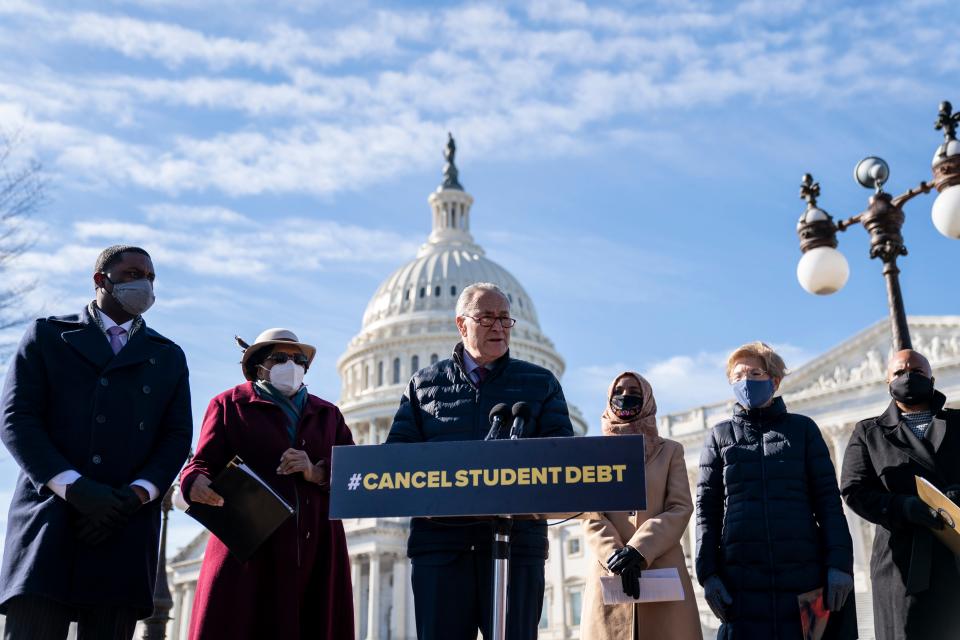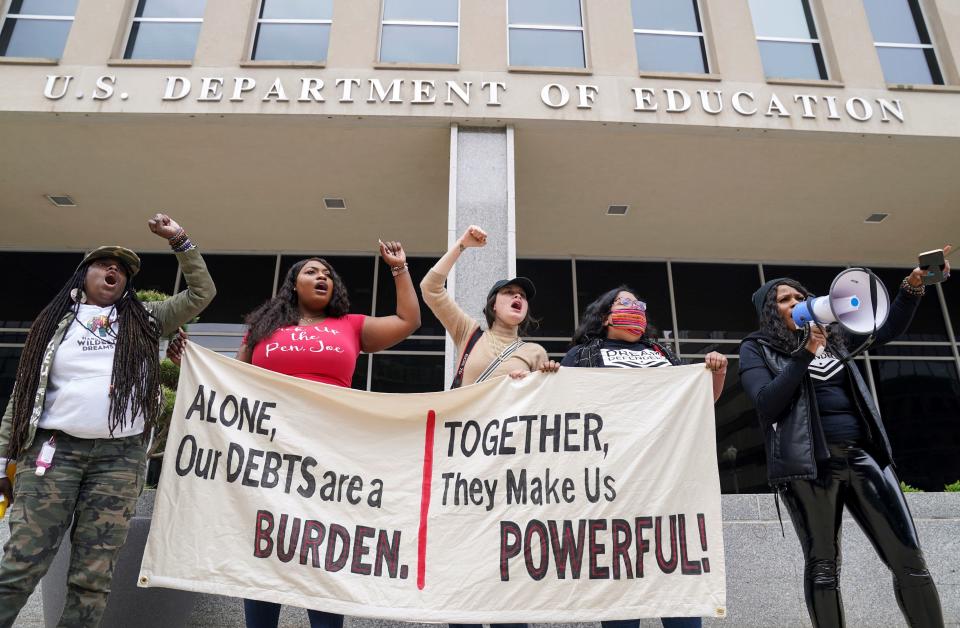Student loan pause set to lift in September. Should borrowers repay or wait for forgiveness?
For anyone with federal student loans, the anticipation of another extension of the student loan payment pause has become a seasonal activity. The pause is slated to end Aug. 31, though it has been extended multiple times over the past two presidential administrations.
For many, the bigger question is will President Joe Biden forgive some or all of the $1.7 trillion student loan debt owed by 40 million-plus Americans?
With just a month left until September, the administration has yet to say officially if the pause will be extended ahead of the November midterm elections. Here's what borrowers should know ahead of the scheduled end of the payment pause.
Are student loan payments on hold? Will the pause continue?
Former President Donald Trump started the payment pause in March 2020. It’s slated to run through Aug. 31. As part of the moratorium, the federal government also set the interest rate on loans at zero percent and instructed servicers to cease collecting overdue debts. The payment pause only applies to federal student loans.
A group of 100 Democratic lawmakers wrote to Biden Thursday and urged him to extend the pause again. They raised concerns about high gas prices and ongoing inflation. They didn’t specify when it should end.
Scott Buchanan is the executive director of the Student Loan Servicing Alliance, a group of student loan servicers. He said the federal government has told servicers to wait on sending notices about repayment. Buchanan said he assumed the department "didn't want to blanket millions of borrowers with communications about resumption if that is going to change."
He said when the pause does end, it will likely take servicers multiple attempts to reach borrowers who have grown accustomed to skipping their loan payments.
How much does the student loan payment pause cost?
The Education Department said in a November financial report that it cost about $53 billion to defer student loan repayments in fiscal year 2021. The Committee for a Responsible Federal Budget, a nonpartisan group focused on government spending, said extending the pause through the end of the year would cost $20 billion. Pushing it through August 2023 would cost another $60 billion and would drive the total cost of the freeze up to $200 billion, according to the group's estimates.
Republicans are pushing Biden to start payments and have argued against debt cancellation. They raise the cost as a concern, and they most recently mentioned a Government Accountability Office report that found the Education Department is projected to lose about $200 billion on student loans the government directly made from fiscal years 1997 to 2021.
The department had previously forecasted making about $115 billion on the loans, and the office said the student loan moratorium and changes to how borrowers repay their loans through income-driven plans have driven up the cost.
Should I pay off my student loans?
Mark Kantrowitz has written multiple books about paying for college and handling student loans. He said borrowers might consider withholding payments during the pause. Instead, borrowers could consider setting those payments aside in their savings account to build a financial cushion. They could also use their savings to pay off debts with higher interest rates, such as personal credit cards.

Because interest rates are at zero, any payment made on student loans go directly to reducing the principal. That may allow borrowers to pay off their loans more quickly, but Kantrowitz warned borrowers they may lose out on widespread forgiveness if it ever becomes a policy.
Still, many borrowers forged ahead and paid off their student loans during the payment pause. And Buchanan said it may be risky for borrowers to base their financial future on an action the government has yet to take, and they ought to come up with a strategy of paying off their loans that doesn't include widespread loan forgiveness.
How do I find my student loan balance?
Betsy Mayotte, president of The Institute of Student Loan Advisors, a group that provides free guidance to borrowers paying back their loans, said borrowers worried about their student loans should make sure they know who holds their loan and their expected monthly payment. That information, Mayotte said, can be found at studentaid.gov.
If that payment doesn’t appear affordable, Mayotte said borrowers should start considering options like an income-driven repayment plan that could lower their monthly bill. These plans can also extend how long borrowers must make payments.
Will federal student loans be forgiven?
Biden campaigned on discharging up to $10,000 in student loan debt per borrower but has yet to say if and when widespread student loan forgiveness is coming. Biden recently said he would make a decision about student loans by the end of August.
In the interim, the Education Department has discharged billions in student loan debt through existing relief programs, like the Public Service Loan Forgiveness program. The program is open to people in a qualifying job, which includes those in nonprofits or government. The waiver runs through October. Mayotte suggested that interested borrowers apply for relief for the program as soon as possible.
Students who attended a school that defrauded them may also receive loan forgiveness. The government recently discharged the debt for anyone who had borrowed federal money to attend schools owned by Corinthian Colleges, an institution with a history of fraud. In that case, borrowers did not have to apply for forgiveness and the relief happened automatically. But most borrowers will not qualify for the government's existing relief programs, which means borrowers seeking relief will likely have to wait longer for answers.

This article originally appeared on USA TODAY: Student loan pause may end soon. Is it better to pay or wait?

